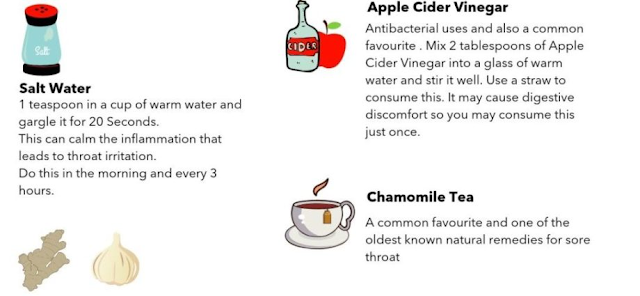HOME REMEDIES FOR SORE THROAT
SORE THROAT - CAUSES, SYMPTOMS, TREATMENT
A sore throat is a common condition that can have many causes, from viruses to infections and bacteria, and in some cases, it can even be cancer. If you have a prolonged sore throat, you should closely monitor the disease's progression and contact a doctor. There are several home remedies to help ease a sore throat. What does a sore throat mean? What is the best medicine for a sore throat?
SORE THROAT - WHAT IS IT?
A sore throat is a common condition that can be the result of many factors. Symptoms associated with inflammation include body temperature, pain, cough, runny nose, frequent muscle aches, and general disability. Although a sore throat is mainly associated with a cold or strep throat, it can also be associated with other ailments such as chicken pox, gingivitis, measles, or smallpox.
A sore throat sometimes makes work difficult and, in addition to discomfort, worsens well-being. We constantly search for the best treatment option because the condition is not pleasant. Today's pace of life does not allow us to lie in bed and recover from a cold.
SORE THROAT - CAUSES
Numerous things, including bacteria, fungi, and viruses, can cause a sore throat. Below you will find the main causes of a sore throat.
90 percent of sore throats are caused by viral infections. Viruses that cause a sore throat include,
for example
1. flu virus,
2. flu virus
3. An infectious condition called mononucleosis that is spread by saliva,
4. measles, a disease that causes a rash and fever
5. Chickenpox is an infection that results in fever and a rough, itchy rash.
6. mumps – an infection that causes the salivary glands in the neck to swell.
bacterial infections – Bacterial infections are one of the main causes of sore throats. Streptococci,
specifically, group A Streptococcus bacteria, are most frequently responsible for its occurrence.
Bacterial tonsillitis and sexually transmitted diseases such as gonorrhea and chlamydia can also cause a sore throat.
Allergy – When the immune system reacts to allergens (pollen, grass, and pet dander),
it releases chemicals that cause symptoms such as nasal congestion, watery eyes, sneezing,
and throat irritation. Excess mucus in the nose can drain into the back of the throat -
this can irritate the throat.
Dry air—dry air can "suck" moisture from the lips and throat, leaving them feeling dry and scratchy.
Make sure the air is properly humidified in the rooms you live in most often.
Smoke, chemicals, and other irritants: The throat can become irritated by a variety of environmental irritants, such as:
1. cigarette smoke,
2. air pollution,
3. cleaning agents and other chemicals.
Throat injury Any trauma, including a blow or cut to the neck, might result in a sore throat.
A food particle caught in the throat can aggravate it as well.
Gastroesophageal reflux disease is a condition in which stomach acid flows back into the esophagus,
the tube that carries food from the mouth to the stomach. The acid irritates the esophagus and throat,
causing symptoms such as heartburn and acid reflux – the backflow of acid into the throat.
Throat tumor - a tumor of the throat, larynx, or tongue is a less common cause of sore throat.
HIV Infection A sore throat and other flu-like symptoms can occasionally appear shortly after
an HIV infection. In addition, a person with HIV may have a chronic or recurrent sore throat from
a fungal infection called oral thrush or a viral infection called cytomegalovirus (CMV),
which can be dangerous for those with compromised immune systems.
SORE THROAT SYMPTOMS
A sore throat caused by bacteria can be distinctly severe, and feverish, the throat is very red and the
tonsils are usually swollen. When a bacterial infection is suspected or confirmed, antibiotics should be
used for the entire time recommended by the doctor, not just until the symptoms disappear.
Important!
Pain caused by a bacterial infection can be accompanied by high fever, muscle aches, runny nose,
cough, and general discomfort.
If the sore throat is prolonged, accompanied by hoarseness, difficulty in swallowing and pain,
and sensation of foreign bodies - it is necessary to consult a doctor to rule out a malignant tumor
of the throat. It is one of the rarest cancers but has a high mortality rate.
SORE THROAT - RISK FACTORS
Although anyone can get a sore throat, some factors make us more susceptible to it. Some of them are:
1. age – children and teenagers are most at risk of developing a sore throat. Children between the ages of 3 and 15 are also more likely to get bacterial pharyngitis,
2. exposure to tobacco smoke – active smoking and passive smoking can irritate the throat. The use of tobacco products also
increases the risk of mouth, throat, and larynx cancer,
3. allergies – seasonal allergies or persistent allergic reactions to dust, mold, or pet dander increase the likelihood
of a sore throat,
4. exposure to chemical irritants – particles from burning fossil fuels and common household chemicals can cause throat irritation,
5. chronic or recurrent sinus infections – runny mucus from the nose can irritate the throat or spread infection
6. crowds of people - viral and bacterial infections spread easily wherever people gather, be it daycare centers, kindergartens, classrooms, offices or airplanes,
7. weakened immunity - you are more susceptible to infections if your immunity is weakened. Common causes of a
weakened immune system include HIV, diabetes, steroid treatment or chemotherapy, stress,
fatigue, and poor diet.
SORE THROAT - WHEN TO SEE A DOCTOR?
A sore throat caused by a viral infection usually disappears in two to seven days.
However, if the sore throat persists and is accompanied by any of the symptoms below,
contact your doctor.
1. difficulty swallowing
2. difficulty breathing or pain when breathing
3. difficulty opening the mouth
4. joint pain,
5. fever over 38 degrees,
6. sore or stiff neck
7. earache,
8. blood in saliva or mucus
9. a week-long or longer sore throat.
SORE THROAT - HOW TO TREAT IT?
A sore throat is treated by managing the symptoms by taking antipyretics to prevent a runny nose,
sore throat, and cough. These medicines are available as tablets, lozenges, sprays, or syrups.
However, the use of topical antibiotics is contraindicated because they do not show antiviral
efficacy.
Antibiotics treat infections caused by bacteria, such as strep throat. Take medicines for bacterial
pharyngitis to stop more serious consequences (pneumonia, bronchitis).
To help with sore throats, try Linden Flower, which can be boiled or made into a tea.
Doctors usually prescribe a course of antibiotics for about 10 days. It is important to take all the
medicines (full treatment, blister pack, suspension bottle) even if you feel better. Stopping the
antibiotic too soon may leave some bacteria alive and you can get sick again.
Lozenges containing ivy and plantain can help with a sore throat. They can be used for bronchitis.
For throat treatment, you can Myrrh and propolis without sugar Herbal Monasterium, which relieves
pain and reduces inflammation.
SORE THROAT - HOME REMEDIES
Here are some home remedies that can help relieve an unpleasant sore throat.
Gargle with salt water - it is a great way to remove bacteria from the body, you should mix a glass
of warm water with 1 teaspoon of salt. Then the patient should rinse the sore throat several times a day.
A little honey doesn't hurt either.
Honey is the solution to all problems - dissolve it (lime is recommended) in boiled and cooled water.
In order to fully benefit from its properties, the water temperature should not exceed 40 degrees Celsius.
Onion Syrup – Surely everyone remembers it from their childhood when mothers prepared
onion syrup for every cold. To prepare the syrup, it is necessary to finely chop the onion,
sprinkle it with sugar, cover it, and put it back in a warm place.
The released juice is used not only for sore throats but also for other infections.
Herbal teas – they won't hurt you, most contain linden or elderberry flowers and raspberries.
Their effect is anti-inflammatory and diaphoretic - it helps to warm up and thus recover faster.
Similarly, licorice and fennel soothe the throat.
You can also try birch leaf or black mallow flower, which are available dried. It is used to make
an herbal tea that supports the condition of the throat. The throat and immunity are also positively
affected by rose and bergamot, which you can find in organic herbal tea Idyllis aromas.
Hoarseness tea, which consists of mallow and thyme herbs, plantain leaves, lung thread, and varsal,
mallow flower, pine buds, grass root, and soap root also soothes the throat and vocal folds.
Garlic - it is called a natural antibiotic, we can also make syrup from it. For this, crush 30 cloves of
garlic, add lemon juice (1 kg), 1 liter of boiled water, and a few tablespoons of honey.
After mixing these ingredients, the syrup is formed, which should be drunk three times a day,
one tablespoon. You can also use chopped garlic for sandwiches. Thanks to its properties,
you can fight infections quickly.
by inhalation - a well-known way to fight a sore throat. To make them, you can use a few drops of oil,
e.g. menthol. In addition to clearing the throat, inhalations have a calming effect.
A sore throat can also be one of the non-obvious symptoms of allergies. If you have other symptoms
in addition to these symptoms, such as a runny nose or itchy eyes, you should do the allergy test, which detects up to 295 allergens.
Humidification of the air It is especially important in the winter season when the rooms heat up constantly and the air is dry.
Try to ventilate the rooms (to remove bacteria) where you stay or use humidifiers.
Aromatic oils can also be used.
Apple Cider Vinegar and Water – Mix two tablespoons of apple cider vinegar in a glass of water
and then gargle with the prepared mixture several times a day. Attention! After each rinse with this mixture, rinse your mouth with clean water.
Beetroot juice – is also suitable for gargling. Mix a glass of beetroot juice with 1 tablespoon of apple
or wine vinegar. Use this mixture to gargle up to ten times each day.
Gargling with an infusion of sage, oak bark, or chamomile. You can also drink Immunity infusion – a freeze-dried organic tea with sage, elderberry, calendula,
and thyme.
Drink plenty of fluids – It is important to hydrate the affected organism regularly. If you don't like
drinking plain water, you can add honey, ginger, or lemon.
Throat warming – you can put a scarf on your head or use a hot water bottle, such as Loffme's cherry stone
and lavender water bottle, which when heated soothes the throat.
SORE THROAT - HOW TO PREVENT IT?
The best way to prevent a sore throat is to avoid the bacteria that cause it and follow good hygiene practices. Follow these tips and teach your child to do this:
1. Wash your hands carefully and often, especially after using the toilet, before eating, and after
sneezing or coughing,
2. Avoid sharing food, glasses, or utensils,
3. Sneeze or cough into a tissue, then discard it.
4. Use alcohol-based sanitizers as an alternative to hand washing when soap and water
are not available.
5. Clean telephones, TV remote controls, and computer keyboards regularly with disinfectant.
Clean phones and remote controls in hotel rooms when traveling,
6. Avoid close contact with sick people.

